Melatonin Is Really Helpful When Your Sleep Is Off Due To Jet Lag
"Hearst Magazines and Yahoo may earn commission or revenue on some items through these links."
Has everything going on in the world lately left you feeling exhausted, both literally and figuratively? If you’ve found yourself struggling to get quality shut-eye and want to do something about it, you’re not alone. Chances are you’ve tried commonly suggested tips like getting to bed at the same time, avoiding caffeine late in the day, turning off screens before bed, exercising regularly, and managing your stress as best you can.
It should go without saying, but sleep is an important part of overall wellness, says Natalie Williams, MD, a family medicine physician at Austin Regional Clinic in Austin, Texas. “Getting enough sleep is good for your heart, brain, mood, and immune system, and helps with productivity,” she says. “Meanwhile, poor sleep has been associated with weight gain and depression.”
However, plenty of Americans have problems with falling or staying asleep, and the stress and anxiety brought on by the Covid-19 pandemic certainly haven’t helped matters there for many.
If all else has failed, you may have found yourself contemplating a sleep aid, but worried about potential side effects, which is a valid concern, Dr. Williams says.
“It’s important to not consider medication sleep aids as a long-term solution — you can develop a tolerance to them, and some sleep aids are contraindicated for certain conditions,” she explains. “If you find yourself using them regularly, [talk to] your doctor, as there may be another issue that’s preventing you from getting quality sleep such as sleep apnea or restless leg syndrome.”
As a temporary solution, however, sleep aids can be a useful tool, and, turns out, you have options to choose from when looking over-the-counter.
What are the different types of sleep aids available over the counter?
According to Dr. Williams, two main types of medication sleep aids you’ll find on the market are sedating antihistamines and melatonin.
Sedating antihistamines fall into two categories: diphenhydramine (think Benadryl and Aleve PM) and doxylamine succinate (the main ingredient found in Nyquil), she says. If it’s something like allergies, headaches or minor pains that are disrupting your sleep, medicines with diphenhydramine can be helpful, whereas a medication like Zzzquil with doxylamine succinate could be a temporary fix if sleep on its own is your issue.
“Antihistamines work by blocking the action of histamine, a substance associated with allergy symptoms,” she explains. “In addition to clearing up congestion, it also causes drowsiness, hence the reason for being used as a sleep aid.”
There are some unpleasant side effects that can arise from regularly using antihistamines, though. These include headaches, drowsiness, blurred vision, and constipation.
“These effects can be especially risky for older people who are at higher risk for dizziness and falls,” Dr. Williams says.
Melatonin is often touted as a more natural option since it’s a hormone that your body also produces naturally.
“[Your body’s] melatonin level tends to be at its highest levels at night and lowest levels in the morning,” Dr. Williams explains. “The idea is that melatonin helps your body know that this is the time to relax and sleep. It doesn’t, therefore, ‘knock you out,’ like antihistamines.”
Unlike with most other sleep aids, you’re unlikely to become dependent on melatonin nor are there many side effects,” she says.
When it comes to which to choose, improving sleep hygiene and using melatonin are recommended before taking sedating sleep aids, especially if you are someone with many medical conditions or medicines, Dr. Williams says. Older adults or those on other medications should speak to their doctor first before adding OTC sleep aids to the mix.
“If you feel the need to use a sleep aid for long periods of time (more than seven days in a row), or if you are increasing your dosage, there is [likely] a bigger issue impacting your sleep, [which you should discuss with your doctor,],” Dr. Williams says.
What are the potential risks of using sleep aids?
Once again, sleep aids aren’t meant to be permanent solutions and come with risks if taken too long. While they’re not addictive in the same sense that prescription sleep aids can be, you can quickly become dependent on them. If you’ve taken sedative-type sleep aids and find that the recommended dose isn’t helping you, talk to your doctor, as it’s easy to build a tolerance to them, but increasing your dose could be dangerous. There also isn’t sufficient research showcasing potential long-term effects, either, according to Harvard Health.
Read on for 10 options to help with occasional sleeplessness.
Try These 10 Over-the-Counter Sleep Aids
If allergies are an issue that disrupts your sleep due to sneezing and stuffiness, taking at night Benadryl can be helpful in this regard. However, keep in mind that the drowsiness it tends to cause will make you likely want to choose a different medication during the day.
If you did something like throw out your back and it’s interfering with your sleep, a medication like Aleve PM can be a solid temporary fix, especially if its daytime counterpart has proven to be helpful in the past.
If Nyquil works like a charm for you when you have a cold, ZzzQuil can be a good option if you’re dealing with a few days of insomnia or lacking quality sleep that isn’t related to another illness.
From the makers of Tylenol PM, these caplets can also help with occasional sleeplessness and may be a good option to go for if you’ve found that its headache counterpart has helped you before, but you aren’t dealing with those symptoms at the moment.
For a more natural option that’s non-habit forming, these melatonin gummies have other touted sleep-assisting ingredients like chamomile, lavender and valerian root to help you wake up feeling refreshed and not groggy.
Sleepytime tea might be the OG natural sleep remedy for helping you unwind, and this “extra” version takes it a step further with valerian root and chamomile as additional ingredients. While valerian is known for being a potent herb, it’s non-habit forming, and neither is this caffeine-free tea.
Lack of sleep has been associated with compromised immunity, and elderberry is often touted as an immunity-boosting source. These melatonin gummies contain this powerhouse ingredient and likely taste better than most other sleep aids to boot.
Valerian root is an herb believed to help with sleep, relaxation and stress management. Per the instructions, simply take two drops by mouth, or add to a beverage such as water, juice or tea.
If you prefer to keep things simple and try straight melatonin rather than a bunch of potential natural remedies at once, this is a good option that is also unflavored.
It’s a bit on the pricey side, but this powder, which can be mixed with milk or hot water can provide a comforting drink similar to hot chocolate. It contains melatonin and magnesium, which is also associated with improving sleep, for an occasional sleeplessness solution.
By this point in your life, you know the importance of good sleep. So, if you’re having trouble dozing off one night, you might be tempted to reach for an over-the-counter (OTC) sleep aid lest you miss out on all those benefits.
But first! Know that there are essentially a few different types of OTC sleep aids: sedating antihistamines, melatonin, and certain herbal teas. It’s the latter category that experts recommend as a go-to “sleep aid,” but there are a few instances when it makes sense to try either of the former two options.
In short, if there’s a short-term event that makes sleep hard to come by, like traveling across time zones, doing shift work that requires you to work odd hours, or, say, dealing with noisy neighbors having a party, you could consider a sedating antihistamine or melatonin, says W. Christopher Winter, MD, a board-certified sleep specialist at Charlottesville Neurology and Sleep Medicine in Virginia, author of The Sleep Solution, and host of the Sleep Unplugged podcast.
Meet the experts: Christopher Winter, MD, is a board-certified sleep specialist at Charlottesville Neurology and Sleep Medicine in Virginia, the author of The Sleep Solution, and the host of the Sleep Unplugged podcast.
Helena Schotland, MD, is a pulmonary and sleep medicine doctor at Mount Sinai in New York City.
Natalie Williams, MD, is a family medicine physician at Austin Regional Clinic in Austin, Texas.
Types Of Over-The-Counter Sleep Aids
If you have trouble sleeping regularly and it’s not due to a reason you can pinpoint (like a short-term stressful event, for example), get help by talking to a medical pro. But if you struggle sporadically due to a reason you can identify, below are some options to consider.
Sedating Antihistamines
These can be diphenhydramine (think Benadryl) or doxylamine succinate (the main ingredient found in NyQuil), Natalie Williams, MD, a family medicine physician at Austin Regional Clinic in Austin, Texas, says. Antihistamines work by blocking the action of histamine. “Histamine is an alerting neurotransmitter, in fact, it's probably the most alerting neurotransmitter in the body,” says Dr. Winter. “So, when we block something that alerts us, it makes us drowsy.”
But there are some unpleasant side effects from using antihistamines on the reg, including headaches, drowsiness, blurred vision, and constipation, so it’s best to save these for rare occasions.
Melatonin
Melatonin is actually a hormone that your body produces naturally. “Your body’s melatonin level tends to be at its highest at night and lowest in the morning,” Dr. Williams says. “Melatonin helps your body know that it's the time to relax and sleep.” That’s where the idea of taking a melatonin supplement comes into play. But to reiterate, melatonin is largely unregulated, so make sure you’re getting yours from a brand you trust and only take it in short-term instances, like to help with jet lag. And if that’s the case, you can actually type in your travel details with Jet Lag Rooster to find out the ideal time to take that melatonin, Dr. Winter says. (Cool, right?)
“People often think more is better, but higher doses of melatonin can actually keep you up,” says Dr. Schotland, adding that taking a small dose several hours before bed is the correct way to use melatonin—not taking a high dose late at night when you’re ready to sleep.
Herbal Teas
“I think tea is interesting because, number one, chamomile, passion flower, valerian, and lavender, are things that have been studied, so I think there can be potential for benefit,” says Dr. Winter. “Anytime we're dealing with an herb that for centuries has been used for sleep, there's probably something there.” He also loves the ritual aspect of tea. (Hear more about bedtime rituals on Dr. Winter’s podcast here.) “Drinking the same beverage every night at the same time is called a food entrainment oscillator and it strengthens our circadian rhythm,” says Dr. Winter.
8 Best Over-The-Counter Sleep Aids To Consider
Sleepytime Extra Caffeine-Free Tea
Sleepytime tea might be the OG natural sleep remedy, and this “extra” version gets a boost of relaxation from valerian root and chamomile. (One note of caution: Dr. Schotland notes that valerian has been associated rarely with liver toxicity, so if you have liver issues, you should steer clear.)
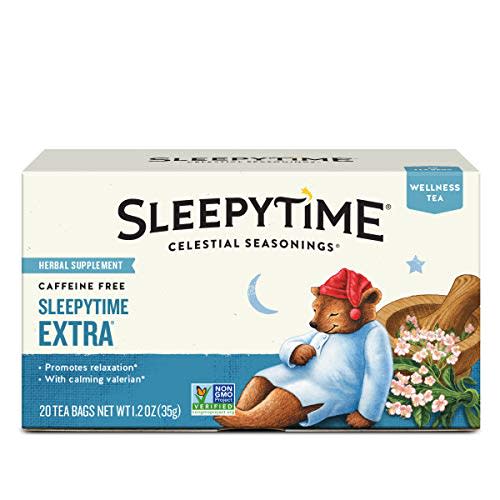
Sleepytime Extra Caffeine-Free Tea
amazon.com
$25.95
Chamomile Flowers
Another great chamomile tea option, this pick comes in a cute package. And in addition to all the other potential benefits of tea in general, the warmth of tea can help your body actually cool down, which is a separate trigger for sleep, Dr. Winter adds.
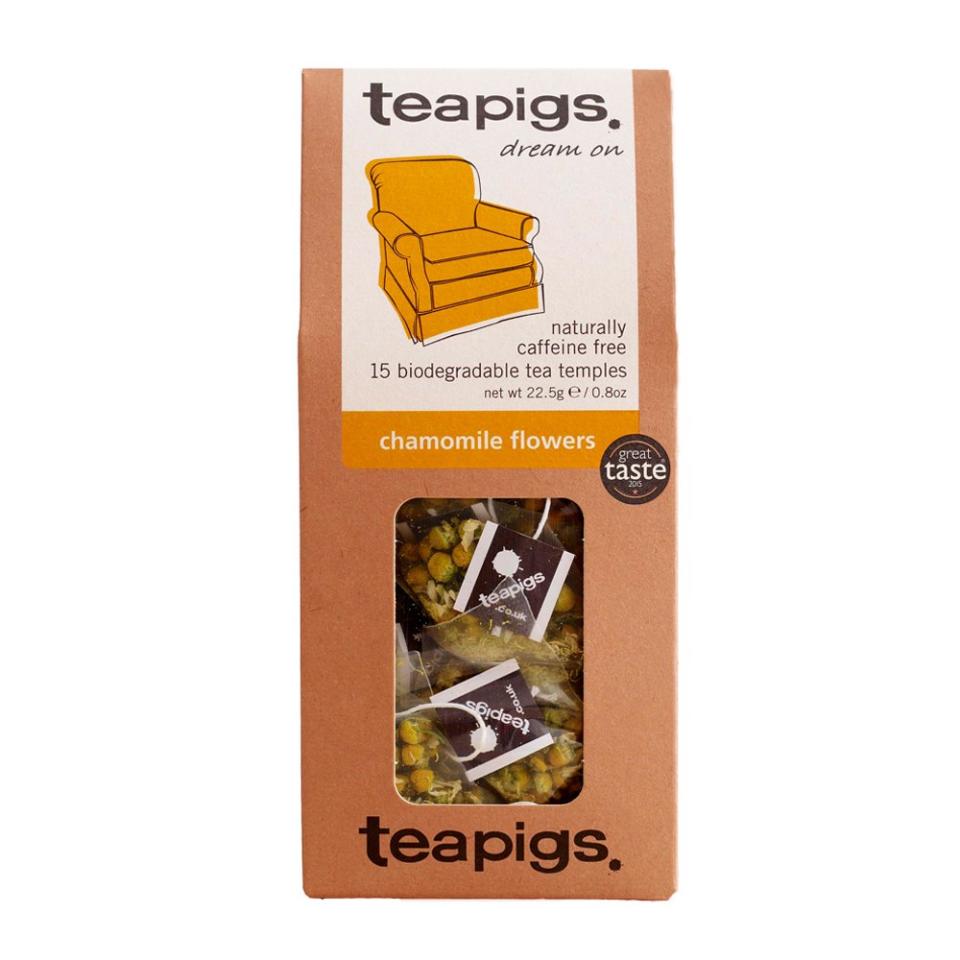
Chamomile Flowers
amazon.com
$8.25
teapigsMelaton-3™
Dr. Winter says that some nutritionist friends trust Thorne to take extra care to regulate their products. This one is third-party certified by the NSF and comes with three milligrams of melatonin.
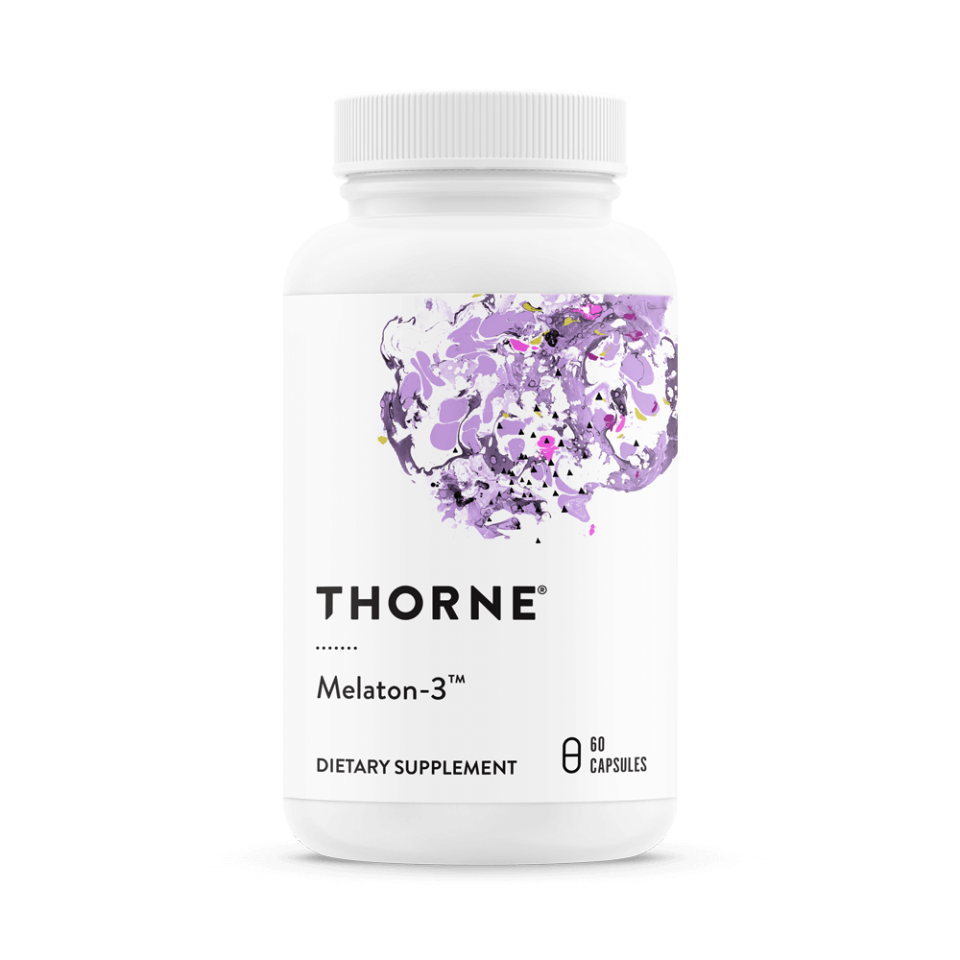
Melaton-3™
thorne.com
$13.00
ThorneMelatonin Tablets
This melatonin option (that's third-party certified by the USP) contains a bit higher of a dose than the Thorne option. (But remember: More doesn't equal better!) It doesn't have artificial flavors or preservatives, and it's gluten-free.
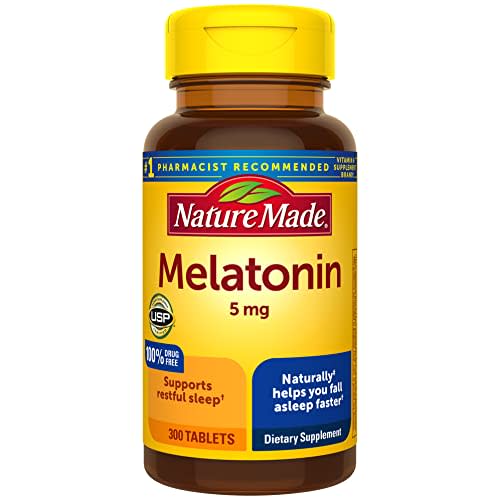
Melatonin Tablets
amazon.com
$27.54
Ultratabs Antihistamine Allergy Relief Tablets
A good old-fashioned Benadryl comes with 25 milligrams of the antihistamine diphenhydramine.
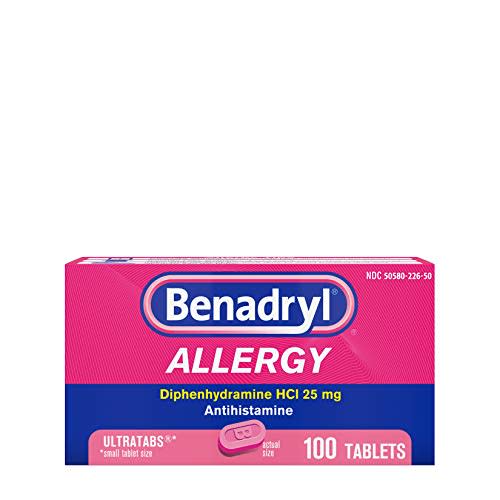
Ultratabs Antihistamine Allergy Relief Tablets
amazon.com
$13.86
Simply Sleep Nighttime Sleep Aid Caplets
Though these caplets are from the makers of Tylenol, they don't contain any pain relievers. Again, the main ingredient is 25 milligrams of diphenhydramine (seeing a pattern?). You may want to give them a shot if Tylenol is your go-to for headaches, colds, and other minor ailments.
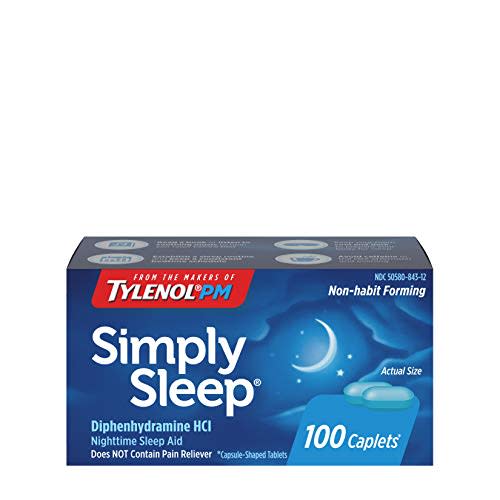
Simply Sleep Nighttime Sleep Aid Caplets
amazon.com
$14.99
Ultra Nighttime Sleep Aid
Unlike NyQuil which also contains a pain reliever and cough suppressant, this product *just* contains 25 milligrams of doxylamine succinate, which is a different type of antihistamine that functions in the same way.
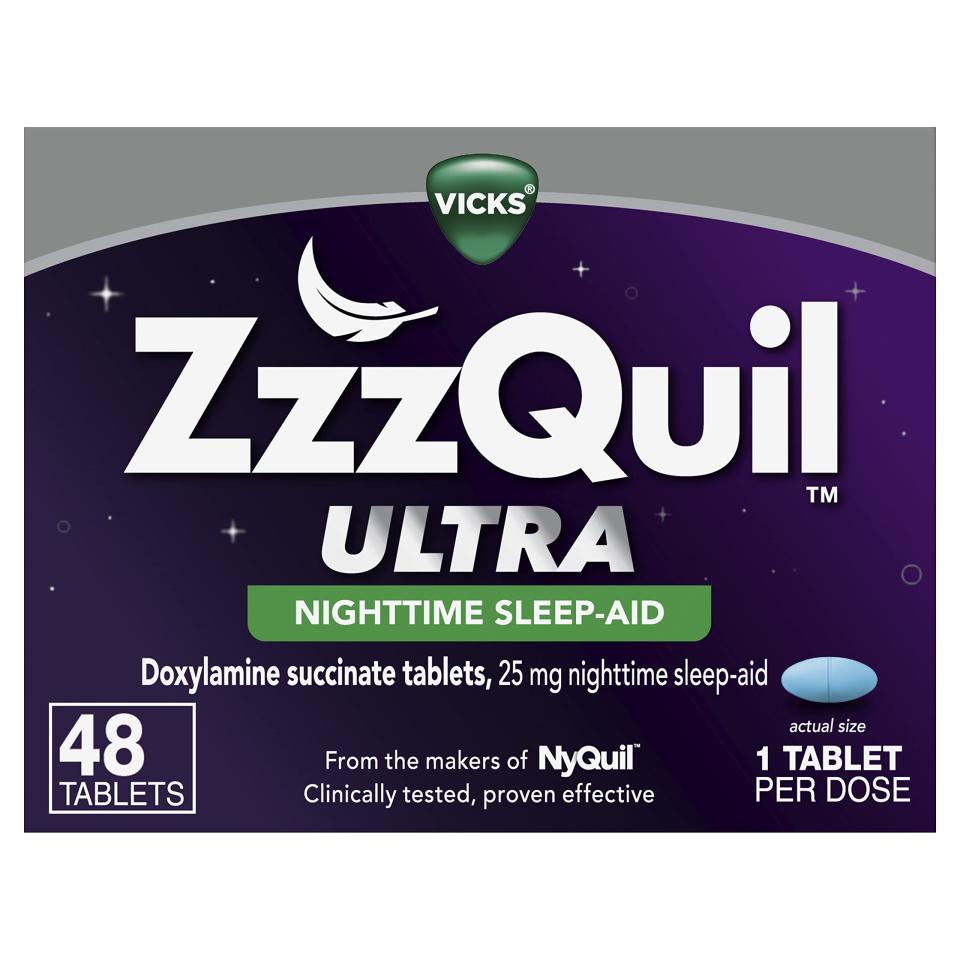
Ultra Nighttime Sleep Aid
amazon.com
$19.49
ZzzQuilAleve PM Pain Relief And Nighttime Sleep Aid
Now, anti-inflammatories often drop body temperature, which could be helpful for sleep. But Dr. Winter cautions against taking them when you’re *not* actually in any pain. So if you, say, have a good reason to take an anti-inflammatory on the same night you have a good reason to take a sleep aid, you could consider this option.
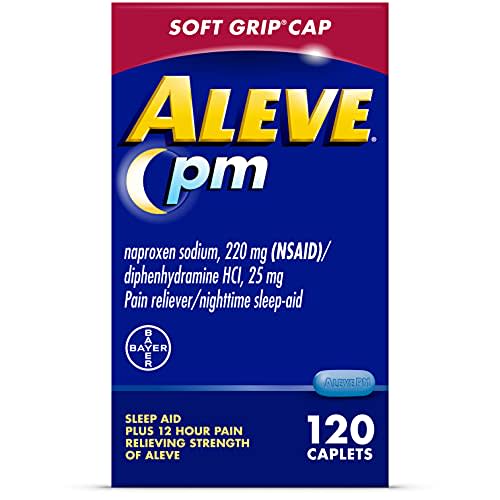
Aleve PM Pain Relief And Nighttime Sleep Aid
amazon.com
$23.34
A Note On Other “Sleep” Supplements
You may have heard about the benefits of magnesium for sleep. And a magnesium supplement may make sense for many of us since more and more people are deficient, Dr. Winter notes. “But taking a little magnesium tonight is not going to cure your inability to fall asleep that night,” he says. It’s more about getting enough magnesium (via foods or supplements) over time in order to create a strong foundation of sleep. The same could be said for supplements like L-theanine.
As for CBD for sleep, Dr. Winter doesn’t necessarily recommend it but he’s not opposed to it, either. “There's still a lot of research to be done,” he says. “I just haven't seen anything compelling yet, but I'm certainly open to it.”

What To Do If You’re Having Chronic Sleep Trouble
If you’re tossing and turning at night on the regular and find yourself Googling “best over the counter sleep aid,” don’t hesitate to talk to your doctor. “There are things out there that can help you, but OTC sleep aids may be prolonging and worsening the problem,” says Dr. Winter. “It's so much easier to treat somebody who's been struggling with sleep for three months than 30 years.”
Now, improving sleep hygiene is always a solid first line of defense. “With kids, they often need a bath and they need a book and they need some time to just relax before we expect them to go to sleep on their own,” says Helena Schotland, MD, a pulmonary and sleep medicine doctor at Mount Sinai in New York City. “Same thing for adults, we can't be working until it's time to shut off the computer, stop thinking about work life, and immediately go to sleep,” she says. “A lot of us need a little bit of a buffer.” That could be meditation or making a list to plan for the next day, for example.

You Might Also Like

